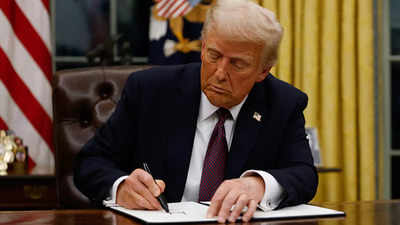- News
- Education News
- News
- Trump in action: Foreign students who join pro-Palestine protests to face deportation under new executive order
Trending
Trump in action: Foreign students who join pro-Palestine protests to face deportation under new executive order
President Trump signed an executive order on January 29, 2025, aimed at deporting non-citizen students involved in pro-Palestinian protests, citing rising antisemitism on U.S. campuses. The order directs the Justice Department to address violence against Jews linked to these protests. Civil rights groups oppose the move, calling it unconstitutional and a violation of free speech. Legal challenges are expected as the order could significantly impact U.S. higher education and immigrant students' rights, as reported by Reuters.
US President Donald Trump signed an executive order aimed at combating antisemitism on US college campuses. The controversial measure includes provisions that threaten the deportation of non-citizen students who participate in pro-Palestinian protests. The move follows rising tensions on campuses, particularly after the October 2023 Hamas-led attack on Israel, which has sparked months of protests and hate crimes across the nation. As reported by Reuters, Trump described the order as necessary to address an "explosion of antisemitism" since the attacks.
Immediate action against 'radical' protests
The executive order directs the US Justice Department to take swift action against individuals engaging in what it labels as "terroristic threats, vandalism, and violence against American Jews" during protests. Trump's administration has particularly targeted non-citizen individuals, including foreign students, involved in pro-Palestinian demonstrations. "To all the resident aliens who joined in the pro-jihadist protests, we put you on notice: come 2025, we will find you, and we will deport you," Trump warned in a fact sheet accompanying the order, as quoted by Reuters.
Backlash from civil rights groups
Deportation threats and legal challenges
Trump’s executive order has already sparked discussion about its potential legal challenges. While the order calls for a review of cases involving alleged civil rights violations on campuses, critics contend that the action may be unconstitutional. The Council on American-Islamic Relations (CAIR) has indicated it will explore legal action should the order be implemented, emphasizing the broader implications for free speech across US higher education.
As the debate unfolds, the executive order has already reshaped the national conversation on the intersection of political activism and immigration laws.
Stay updated with the latest education news on Times of India. Explore the CBSE date sheet for Class 10 and 12 across Arts, Science, and Commerce streams.
End of Article
FOLLOW US ON SOCIAL MEDIA











